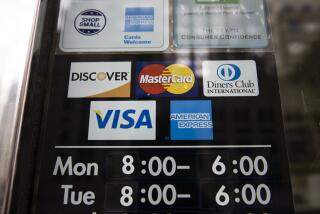Increase in Use of Credit Is Smallest in 5 Years : Consumers Show Restraint in Adding to Debt in December
- Share via
WASHINGTON — Americans took out $105 million more in consumer credit than they paid off in December, the smallest increase in five years, the government reported Friday, with the slowdown attributed to changing borrowing patterns brought on by the new tax law.
The Federal Reserve Board said that the relatively tiny December increase compared to gains of $3.28 billion in November and $7.21 billion in October. It was the smallest monthly increase since a $63-million credit rise in December, 1981.
The Fed said the report could be the first evidence of changes resulting from the tax law, which will phase out interest rate deductions for anything but home mortgage loans.
Credit card debt fell by $180 million in December after a November gain of $1.58 billion. The category that includes cash loans from banks and other short- and medium-term borrowing dropped by $465 million, following a $1.13-billion November gain.
The consumer credit report does not cover loans secured by real estate such as home equity loans, which consumers have been turning to in order to still qualify interest payments for tax deductions.
The small size of the December increase puzzled economists, who had been looking for a much larger figure because consumers were rushing to purchase autos so as to qualify for an expiring sales tax deduction.
Analysts speculated that some of the rise in auto loans may not have shown up on this report because the sales were completed very late in the month and will instead be reflected in the January figures.
Auto loans climbed by $706 million in December, compared to growth of $547 million in November and $4.27 billion in October.
Sandra Shaber, an economist with The Futures Group, an economic consulting firm, called the figure an aberration and said it does not signal a dramatic slowdown in consumer spending that could threaten to push the economy into a recession.
“No one should interpret this very small number to mean that consumers are tearing up their credit cards and retrenching,” she said.
But most economists are calling for slower growth in consumer spending this year. This slowdown may hold back overall economic growth, and many economists are forecasting that 1987 will show little improvement from the lackluster performance turned in during 1986.
The December credit change translated into an annual rate of increase of 0.2%. This compared to consumer credit growth for all 1986 of 11%, which was down from an 18% growth in credit during 1985.
The various changes last month left total consumer debt at $594.93 billion at the end of December, after adjusting for seasonal factors.
More to Read
Inside the business of entertainment
The Wide Shot brings you news, analysis and insights on everything from streaming wars to production — and what it all means for the future.
You may occasionally receive promotional content from the Los Angeles Times.










